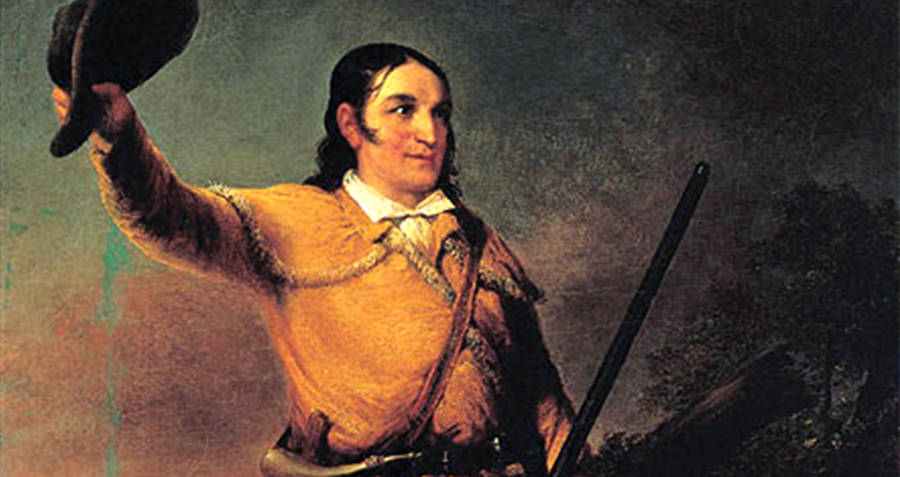
Most people know Davy Crockett as a daring frontiersman, but he actually had quite the interesting life outside of his wild adventures.

Wikimedia CommonsDavy Crockett during the war of 1812.
Long before people were threatening to move to Canada should the election results not swing in their favor, famed frontiersman Davy Crockett was encouraging people in a similar protest. Should Martin Van Buren be elected president, Crockett said, he would flee the south.
“I told the people of my district that I would serve them as faithfully as I had done,” he said. “But if not, they might go to hell, and I would go to Texas.”
While many people remember Crockett, they may not remember him as one touting his political opinions. After all, how many people remember Crockett, not as an adventurous backwoodsman, but as a beloved politician?
Most people have heard the name Davy Crockett, but how many of them know exactly who Davy Crockett really was? He’s known as a frontiersman, popular for larger-than-life explorations that were dramatized into stage plays and storybooks, but throughout his life, being an adventurer was only a small part of what he had to offer his country.
Born David Crockett in Tennessee in 1786, Davy had an unconventional upbringing. At the age of 12, his father sold him into indentured servitude, in an effort to pay off the Crockett family’s debt. While he was treated well and paid for his services as a ranch hand in Virginia, Crockett soon wished to return home to Tennessee.
However, his return to his homeland was short, after he found that he was no fan of schooling. After coming to this realization, he moved back to Virginia and joined several cattle drives. He eventually worked to relieve all of his family’s debt, and finally moved permanently to Virginia to work for a cattle rancher.
Within a period of nine years, Davy Crockett married twice and fathered five children. Over those years, he led a quiet life, caring for his family alongside his brother’s family, and working on the cattle ranch he had worked on as a young man.

Wikimedia CommonsDavy Crockett during his time in the United States House of Representatives.
Then, in 1812, his family man attitude changed, and he began the lifestyle he is perhaps most famous for. During the war of 1812, he served under General Andrew Jackson, in the Tennessee militia. Crockett immediately joined the war effort, enlisting as a scout for a term of 90 days.
Rather than partake in the active fighting, Crockett found that his skills were better suited to hunting game to feed the soldiers, rather than killing Native American warriors. He served until the end of 1813, then again from 1814 to 1815, though he hired a young man to take his place through the end of his term.
In 1817, Davy Crockett moved west, to Lawrence County, Tenn., with his family. There, he thought he’d try his hand at a career in politics.
The attempt was, for the most part, a futile one. Though he was elected lieutenant colonel of the Fifty-seventh Regiment of Tennessee Militia, he was operating multiple businesses at the time and found himself torn between his work and his family. Eventually, he resigned and settled back into family life.
However, family life, it seemed, did not settle into him. Not long after he resigned from his post with the regiment, he was back in a political race, pushing for a seat in the Tennessee General Assembly. Alas, in 1821, he got his seat, and just three years later another one, in the United States House of Representatives.
As a politician, Davy Crockett was determined not to be a stuffy one. During his time in the House of Representatives, he tried his hand at several other hobbies such as manufacturing wood barrels and gunpowder. His biggest hobby, however, would become his most famous: big game hunting.
In the woods of Tennessee, Davy Crockett found fame hunting black bears and selling their pelts, meat, and oil for a profit. He claimed that between 1825 and 1826 he killed 105 bears. It was this claim, as well as his fondness for hunting other dangerous game, that made him the frontiersman so many people think of him as today.
In fact, in 1831, a play was written about his life, centering around the fictional frontiersman Nimrod Wildfire. Though it never referred to Crockett by name, there was no doubt he served as the inspiration. The play even forced Crockett himself to pen an autobiography, to make sure that everyone knew the truth about his marvelous adventures.

Wikimedia CommonsDavy Crockett shortly before his death.
And, indeed, it was a good thing he wrote about his life in his autobiography. Just two years later, he would find himself struck down in the Battle of the Alamo.
According to accounts, Crockett was killed when the Mexican army invaded. However, controversy surrounded his death, as there were those who claimed he had surrendered to the Mexicans and was executed, though the rumors were unfounded.
Davy Crockett was perhaps remembered most for his excursions as a frontiersman, but the truth is that was just a small part of his life. His contributions to his country through his work as a politician and his servitude in several important American battles is commemorated with several monuments scattered throughout Texas and Tennessee. Today, his legacy still lives on through the many sayings of his published in almanacs throughout the years.
“Always be sure you are right,” one said, “then go ahead.”
Next, check out these amazing photos of the American frontier. Then, read about Peter Freuchen, another crazy interesting man.

Leave a Reply